small
Showing 61–72 of 106 results
-
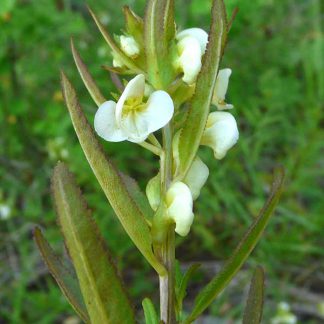
Pedicularis racemosa / leafy lousewort
- clumps of plants with maroon stems in forest understory
- white to pink flowers in upper leaf axils
- flowers have beak-like upper lip and wide three-lobed lower lip
- leaves narrow and tapering, slightly serrate, maroon when young
-

Penstemon cyaneus / blue penstemon
- two-toned totally tubular flower (blue and pink-ish)
- early spring to at least mid-summer
- widespread in low disturbance habitats - even when rocky and "bare"
-

Penstemon procerus / littleflower penstemon
- low growing in exposed, undisturbed habitats
- tight cluster/whorls of small purple/blue/pink flowers
- tubular flowers, with lips around opening
-

Penstemon rydbergii / Rydberg’s penstemon
- small, blue/purple tubular flowers in leafy whorls
- flowers lack glands or hairs
- basal rosette of bright green, spoon-shaped leaves without glands or hairs
- stem leaves are lanceolate, around flower clusters
- wetter areas, but also along Victor/Driggs bike path
-
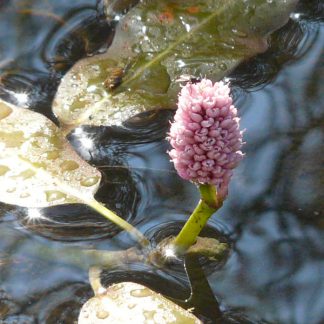
Persicaria amphibia / water smartweed
- shocking pink flower clusters
- oval, leathery leaves
- either submerged or on stream or pond banks
-

Phlox diffusa / spreading phlox
- low, spreading, moss-like (before blooming)
- flowers 5-petaled, a variety of colors, and with a tube below the petals
- many habitat types incl. mountain slopes, rocky terrain, dry forests or with sagebrush
- blooms in early spring to early summer
- confusable with P. hoodii
-
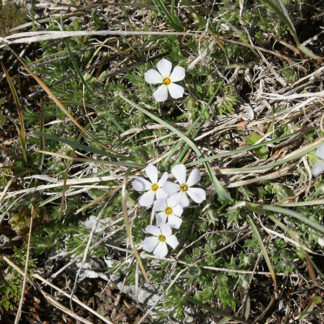
Phlox hoodii / spiny phlox
- half-inch, five (or four) petaled flower with yellow center
- low to ground, mat forming, moss-like
- tightly packed, narrow, spiny leaves
- blooms in very early spring, just after snowmelt
- with sagebrush on dry, rocky soils
-
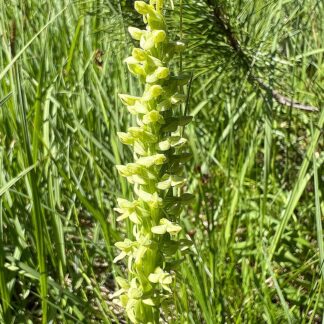
Platanthera huronensis / green bog orchid
- usually in bogs, fens, wetlands
- up to two feet tall, but often shorter
- thick, nearly vertical leaves with parallel veins (i.e. grass-like)
- up to 75 very small flowers per stem (raceme)
- flowers -light green to greenish-white; two petals, three sepals, a lip and club-like spur
- lip is not pouch-like
-

Polemonium occidentale / western Jacob’s ladder
- brilliantly blue flowers with bright yellow anthers, in clusters
- pinnately compound leaves with up to 27 narrow, lance-shaped leaflets
- most leaves on separate stems from the flowers
- usually in wetlands
-

Potentilla fruticosa / shrubby cinquefoil
- low, deciduous, shrub; wetlands and riparian zones
- yellow buttercup-like flowers with 5 leaflets, often in clusters
- blooms from June until frost
- pinnately compound leaves, typically with 5 leaflets
- fruit (achene) remains into winter
-
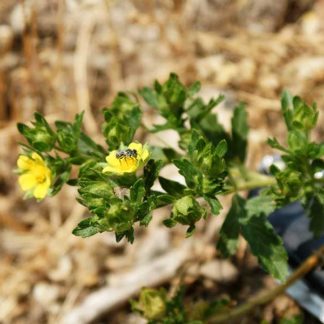
Potentilla norvegica / rough cinquefoil
- 5 yellow petals, not fused
- 5 sepals longer than petals, esp. after flowering
- numerous stamens and pistils
- compound leaves with leaflets grouped in 3s
- prominent veins; toothed margins
- hairy stems
- mostly in disturbed areas, including gardens
-

Primula parryi / Parry’s primrose
- striking, bright magenta (or pink) flowers with yellow centers, 5 petals
- 3 to 30 flowers per stalk
- brilliant green foliage as a rosette
- foliage releases horrible smell with the slightest touch
- typically at higher altitudes in wet places
Showing 61–72 of 106 results